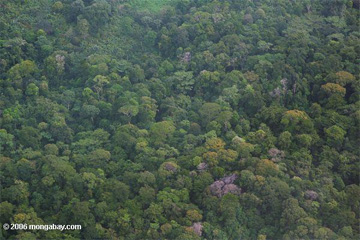|
|
The World Bank’s Forest Carbon Partnership Facility (FCPF) has approved REDD readiness plans (R-Plans) for Panama and Guyana, and rejected a plan for Indonesia, reports the U.N. and the Bank Information Center, an advocacy group.
Readiness plans are the first step toward a country qualifying for payments under the proposed Reducing Emissions from Deforestation and forest Degradation (REDD) mechanism, a climate change mitigation scheme that would pay tropical countries for conserving their forests. The details of REDD are expected to be hammered out this December at the UN Framework Convention on Climate Change meeting in Copenhagen.
 Rainforest in Panama |
Readiness plans involve developing a baseline reference scenario for a country’s historical and projected deforestation rates, as well as a adopting strategies to reduce forest clearing and designing systems to monitor, report and verify reductions in greenhouse gas emissions from avoided deforestation.
Plans by Guyana, Panama and Indonesia were presented to the FCPF’s Technical Advisory Panel earlier this year but all three were found to be incomplete in their analysis of the drivers of deforestation. After modification, the plans by Guyana and Panama were approved, while Indonesia’s plan was sent back for revision.
A total of 14 countries have won funding from the FCPF to kick start preparation of readiness plans. The countries include six in Africa (the Democratic Republic of Congo, Gabon, Ghana, Kenya, Liberia, Madagascar); five in Latin America (Bolivia, Costa Rica, Guyana, Mexico, Panama); and three in Asia (Nepal, Lao PDR, and Vietnam).
Deforestation accounts for nearly a fifth of global greenhouse gas emissions, a share greater than all the world’s planes, trains, ship, cars, and trucks combined.
Related articles